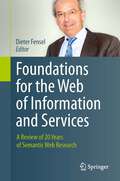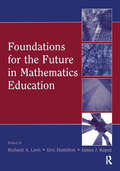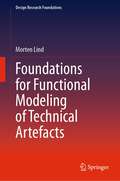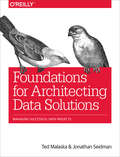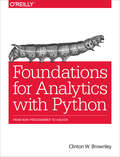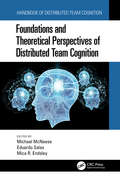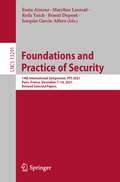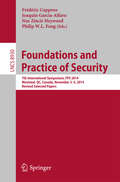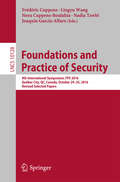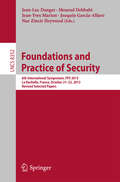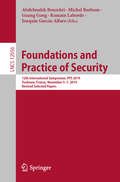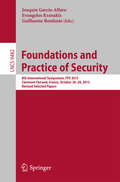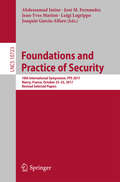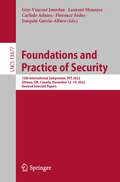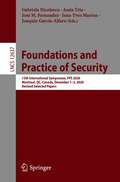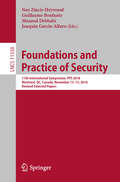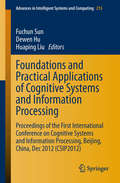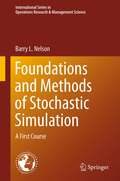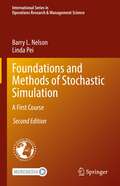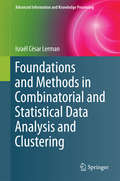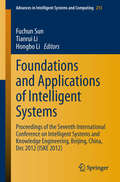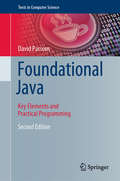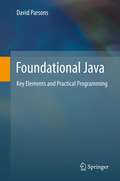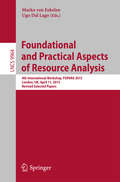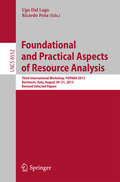- Table View
- List View
Foundations for the Web of Information and Services: A Review of 20 Years of Semantic Web Research
by Dieter FenselIn the mid 1990s, Tim Berners-Lee had the idea of developing the World Wide Web into a "Semantic Web", a web of information that could be interpreted by machines in order to allow the automatic exploitation of data, which until then had to be done by humans manually. One of the first people to research topics related to the Semantic Web was Professor Rudi Studer. From the beginning, Rudi drove projects like ONTOBROKER and On-to-Knowledge, which later resulted in W3C standards such as RDF and OWL. By the late 1990s, Rudi had established a research group at the University of Karlsruhe, which later became the nucleus and breeding ground for Semantic Web research, and many of today's well-known research groups were either founded by his disciples or benefited from close cooperation with this think tank. In this book, published in celebration of Rudi's 60th birthday, many of his colleagues look back on the main research results achieved during the last 20 years. Under the editorship of Dieter Fensel, once one of Rudi's early PhD students, an impressive list of contributors and contributions has been collected, covering areas like Knowledge Management, Ontology Engineering, Service Management, and Semantic Search. Overall, this book provides an excellent overview of the state of the art in Semantic Web research, by combining historical roots with the latest results, which may finally make the dream of a "Web of knowledge, software and services" come true.
Foundations for the Future in Mathematics Education
by Richard A. Lesh; Eric Hamilton; James J. KaputThe central question addressed in Foundations for the Future in Mathematics Education is this: What kind of understandings and abilities should be emphasized to decrease mismatches between the narrow band of mathematical understandings and abilities that are emphasized in mathematics classrooms and tests, and those that are needed for success beyond school in the 21st century? This is an urgent question. In fields ranging from aeronautical engineering to agriculture, and from biotechnologies to business administration, outside advisors to future-oriented university programs increasingly emphasize the fact that, beyond school, the nature of problem-solving activities has changed dramatically during the past twenty years, as powerful tools for computation, conceptualization, and communication have led to fundamental changes in the levels and types of mathematical understandings and abilities that are needed for success in such fields. For K-12 students and teachers, questions about the changing nature of mathematics (and mathematical thinking beyond school) might be rephrased to ask: If the goal is to create a mathematics curriculum that will be adequate to prepare students for informed citizenship—as well as preparing them for career opportunities in learning organizations, in knowledge economies, in an age of increasing globalization—how should traditional conceptions of the 3Rs be extended or reconceived? Overall, this book suggests that it is not enough to simply make incremental changes in the existing curriculum whose traditions developed out of the needs of industrial societies. The authors, beyond simply stating conclusions from their research, use results from it to describe promising directions for a research agenda related to this question. The volume is organized in three sections: *Part I focuses on naturalistic observations aimed at clarifying what kind of “mathematical thinking” people really do when they are engaged in “real life” problem solving or decision making situations beyond school. *Part II shifts attention toward changes that have occurred in kinds of elementary-but-powerful mathematical concepts, topics, and tools that have evolved recently—and that could replace past notions of “basics” by providing new foundations for the future. This section also initiates discussions about what it means to “understand” the preceding ideas and abilities. *Part III extends these discussions about meaning and understanding—and emphasizes teaching experiments aimed at investigating how instructional activities can be designed to facilitate the development of the preceding ideas and abilities. Foundations for the Future in Mathematics Education is an essential reference for researchers, curriculum developers, assessment experts, and teacher educators across the fields of mathematics and science education.
Foundations for Functional Modeling of Technical Artefacts (Design Research Foundations)
by Morten LindThis monograph provides a new framework for modelling goals and functions of control systems. It demonstrates how to use means-end concepts and various aspects of action to describe the relations between the structure, dispositions, functions, and goals of technical systems and with human action. The author developed this approach as part of his research on Multilevel Flow Modelling (MFM). He based the framework on concepts of action and means-end analysis drawing on existing theories from several areas of study, including philosophical logic, semiotics, and phenomenological approaches to social science. Here, he applies it to three modeling situations related to the interaction of technical artefacts and humans. One involves the relation between designer and artefact, another the relation between technical artefact and its user, and the third the relation between a natural object and its user. All three are relevant for modelling complex automated processes interacting with human operators. The book also discusses challenges when applying the foundations for modelling of technical artefacts. Overall, it provides a cross disciplinary integration of several fields of knowledge. These disciplines include intelligent process control, human machine interaction, and process and automation design. As a result, researchers and graduate students in computer science, engineering, and philosophy of technology will find it a valuable resource.
Foundations for Architecting Data Solutions: Managing Successful Data Projects
by Ted Malaska Jonathan SeidmanWhile many companies ponder implementation details such as distributed processing engines and algorithms for data analysis, this practical book takes a much wider view of big data development, starting with initial planning and moving diligently toward execution. Authors Ted Malaska and Jonathan Seidman guide you through the major components necessary to start, architect, and develop successful big data projects.Everyone from CIOs and COOs to lead architects and developers will explore a variety of big data architectures and applications, from massive data pipelines to web-scale applications. Each chapter addresses a piece of the software development life cycle and identifies patterns to maximize long-term success throughout the life of your project.Start the planning process by considering the key data project typesUse guidelines to evaluate and select data management solutionsReduce risk related to technology, your team, and vague requirementsExplore system interface design using APIs, REST, and pub/sub systemsChoose the right distributed storage system for your big data systemPlan and implement metadata collections for your data architectureUse data pipelines to ensure data integrity from source to final storageEvaluate the attributes of various engines for processing the data you collect
Foundations for Analytics with Python: From Non-Programmer to Hacker
by BrownleyIf you're like many of Excel's 750 million users, you want to do more with your data--like repeating similar analyses over hundreds of files, or combining data in many files for analysis at one time. This practical guide shows ambitious non-programmers how to automate and scale the processing and analysis of data in different formats--by using Python.After author Clinton Brownley takes you through Python basics, you'll be able to write simple scripts for processing data in spreadsheets as well as databases. You'll also learn how to use several Python modules for parsing files, grouping data, and producing statistics. No programming experience is necessary.Create and run your own Python scripts by learning basic syntaxUse Python's csv module to read and parse CSV filesRead multiple Excel worksheets and workbooks with the xlrd modulePerform database operations in MySQL or with the mysqlclient moduleCreate Python applications to find specific records, group data, and parse text filesBuild statistical graphs and plots with matplotlib, pandas, ggplot, and seabornProduce summary statistics, and estimate regression and classification modelsSchedule your scripts to run automatically in both Windows and Mac environments
Foundations and Theoretical Perspectives of Distributed Team Cognition
by Michael D. McNeese; Eduardo Salas; Mica R. EndsleyThe background and interwoven streams of team cognition and distributed cognition fermenting together has wielded new nuances of exploration, which continue to be relevant for a theoretical understanding of team phenomena. Foundations and Theoretical Perspectives of Distributed Teams Cognition looks at fundamentals, theoretical concepts, and how theory informs perspectives of thinking for distributed team cognition. The chapters yield a broad understanding of the nature of diverse thinking and insights into technologies, foundations, and theoretical perspectives of distributed team cognition. Features Generates historical patterns and significance that compose developmental trajectories Explains multiple perspectives that incorporate an interdisciplinary understanding that specifies diverse theories Identifies and develops particular challenges resident within team simulation studies and then illustrates research frameworks Highlights and reviews how team simulations are used to produce dynamic experimental results Investigates and studies research variables within distributed team cognition
Foundations and Practice of Security: 14th International Symposium, FPS 2021, Paris, France, December 7–10, 2021, Revised Selected Papers (Lecture Notes in Computer Science #13291)
by Esma Aïmeur Maryline Laurent Reda Yaich Benoît Dupont Joaquin Garcia-AlfaroThis book constitutes the revised selected papers of the 14th International Symposium on Foundations and Practice of Security, FPS 2021, held in Paris, France, in December 2021. The 18 full papers and 9 short paper presented in this book were carefully reviewed and selected from 62 submissions. They cover a range of topics such as Analysis and Detection; Prevention and Efficiency; and Privacy by Design. Chapters “A Quantile-based Watermarking Approach for Distortion Minimization”, “Choosing Wordlists for Password Guessing: An Adaptive Multi-Armed Bandit Approach” and “A Comparative Analysis of Machine Learning Techniques for IoT Intrusion Detection” are available open access under a Creative Commons Attribution 4.0 International License via link.springer.com.
Foundations and Practice of Security
by Frédéric Cuppens Joaquin Garcia-Alfaro Nur Zincir Heywood Philip W. L. FongThis book constitutes the thoroughly refereed post-proceedings of the 7th Symposium on Foundations and Practice of Security, FPS 2014, held in Montreal, QC, Canada, in November 2014. The 18 revised full papers presented together with 5 short papers and 2 position papers were carefully reviewed and selected from 48 submissions. The papers are organized in topical sections on privacy; software security and malware analysis; network security and protocols; access control models and policy analysis; protocol verification; and cryptographic technologies.
Foundations and Practice of Security
by Frédéric Cuppens Lingyu Wang Nora Cuppens-Boulahia Nadia Tawbi Joaquin Garcia-AlfaroThis book constitutes the carefully refereed and revised selected papers of the 4th Canada-France MITACS Workshop on Foundations and Practice of Security, FPS 2011, held in Paris, France, in May 2011. The book contains a revised version of 10 full papers, accompanied by 3 keynote addresses, 2 short papers, and 5 ongoing research reports. The papers were carefully reviewed and selected from 30 submissions. The topics covered are pervasive security and threshold cryptography; encryption, cryptanalysis and automatic verification; and formal methods in network security.
Foundations and Practice of Security
by Jean Luc Danger Mourad Debbabi Jean-Yves Marion Joaquin Garcia-Alfaro Nur Zincir HeywoodThis book constitutes the carefully refereed post-proceedings of the 6th Symposium on Foundations and Practice of Security, FPS 2013, held in La Rochelle, France, in October 2013. The 25 revised full papers presented together with a keynote address were carefully reviewed and selected from 65 submissions. The papers are organized in topical sections on security protocols, formal methods, physical security, attack classification and assessment, access control, cipher attacks, ad-hoc and sensor networks, resilience and intrusion detection.
Foundations and Practice of Security: 12th International Symposium, FPS 2019, Toulouse, France, November 5–7, 2019, Revised Selected Papers (Lecture Notes in Computer Science #12056)
by Joaquin Garcia-Alfaro Michel Barbeau Abdelmalek Benzekri Guang Gong Romain LabordeThis book constitutes the revised selected papers of the 12th International Symposium on Foundations and Practice of Security, FPS 2019, held in Toulouse, France, in November 2019.The 19 full papers and 9 short papers presented in this book were carefully reviewed and selected from 50 submissions. They cover a range of topics such as machine learning approaches; attack prevention and trustworthiness; and access control models and cryptography.
Foundations and Practice of Security
by Joaquin Garcia-Alfaro Evangelos Kranakis Guillaume BonfanteThis book constitutes the thoroughly refereedpost-conference proceedings of the 8th International Symposium on Foundationsand Practice of Security, FPS 2015, held in Clermont-Ferrand, France, inOctober 2015. The 12 revised full papers presented together with 8short papers and 2 keynote talks were carefully reviewed and selected from 58submissions. The papers are organized in topical sections on RFID, sensors andsecure computation; security policies and biometrics; evaluation of protocolsand obfuscation security; spam emails, botnets and malware.
Foundations and Practice of Security
by Abdessamad Imine José M. Fernandez Jean-Yves Marion Luigi Logrippo Joaquin Garcia-AlfaroThis book constitutes revised selected papers from the 10th International Symposium on Foundations and Practice of Security, FPS 2017, held in Nancy, France in October 2017. The 20 papers presented in this volume were carefully reviewed and selected from 53 submissions. The papers were organized in topical sections named: access control; formal verification; privacy; physical security; network security, encrypted DBs and blockchain; vulnerability analysis and deception systems; and defence against attacks and anonymity.
Foundations and Practice of Security: 15th International Symposium, FPS 2022, Ottawa, ON, Canada, December 12–14, 2022, Revised Selected Papers (Lecture Notes in Computer Science #13877)
by Guy-Vincent Jourdan Laurent Mounier Carlisle Adams Florence Sèdes Joaquin Garcia-AlfaroThis book constitutes the refereed proceedings of the 15th International Symposium on Foundations and Practice of Security, FPS 2022, held in Ottawa, ON, Canada, during December 12–14, 2022.The 26 regular and 3 short papers presented in this book were carefully reviewed and selected from 83 submissions. The papers have been organized in the following topical sections: Cryptography; Machine Learning; Cybercrime and Privacy; Physical-layer Security; Blockchain; IoT and Security Protocols; and Short Papers.
Foundations and Practice of Security: 13th International Symposium, FPS 2020, Montreal, QC, Canada, December 1–3, 2020, Revised Selected Papers (Lecture Notes in Computer Science #12637)
by Gabriela Nicolescu Assia Tria José M. Fernandez Jean-Yves Marion Joaquin Garcia-AlfaroThis book constitutes the revised selected papers of the 13th International Symposium on Foundations and Practice of Security, FPS 2020, held in Montréal, QC, Canada, in December 2020. The 11full papers and 1 short paper presented in this book were carefully reviewed and selected from 23 submissions. They cover a range of topics such as Analysis and Detection; Prevention and Efficiency; and Privacy by Design.
Foundations and Practice of Security: 11th International Symposium, FPS 2018, Montreal, QC, Canada, November 13–15, 2018, Revised Selected Papers (Lecture Notes in Computer Science #11358)
by Nur Zincir-Heywood Guillaume Bonfante Mourad Debbabi Joaquin Garcia-AlfaroThis book constitutes the revised selected papers of the 11th International Symposium on Foundations and Practice of Security, FPS 2018, held in Montreal, QC, Canada, in March 2018. The 16 full papers, 1 short paper, 1 position paper and 2 invited papers presented in this book, were carefully reviewed and selected from 51 submissions. They cover a range of topics including mobile security; cloud security and big data; IoT security; software security, malware analysis, and vulnerability detection; cryptography; cyber physical security and hardware security; and access control.
Foundations and Practical Applications of Cognitive Systems and Information Processing
by Fuchun Sun Dewen Hu Huaping Liu"Foundations and Practical Applications of Cognitive Systems and Information Processing" presents selected papers from the First International Conference on Cognitive Systems and Information Processing, held in Beijing, China on December 15-17, 2012 (CSIP2012). The aim of this conference is to bring together experts from different fields of expertise to discuss the state-of-the-art in artificial cognitive systems and advanced information processing, and to present new findings and perspectives on future development. This book introduces multidisciplinary perspectives on the subject areas of Cognitive Systems and Information Processing, including cognitive sciences and technology, autonomous vehicles, cognitive psychology, cognitive metrics, information fusion, image/video understanding, brain-computer interfaces, visual cognitive processing, neural computation, bioinformatics, etc. The book will be beneficial for both researchers and practitioners in the fields of Cognitive Science, Computer Science and Cognitive Engineering. Fuchun Sun and Huaping Liu are both professors at the Department of Computer Science & Technology, Tsinghua University, China. Dr. Dewen Hu is a professor at the College of Mechatronics and Automation, National University of Defense Technology, Changsha, China.
Foundations and Methods of Stochastic Simulation
by Barry NelsonThis graduate-level text covers modeling, programming and analysis of simulation experiments and provides a rigorous treatment of the foundations of simulation and why it works. It introduces object-oriented programming for simulation, covers both the probabilistic and statistical basis for simulation in a rigorous but accessible manner (providing all necessary background material); and provides a modern treatment of experiment design and analysis that goes beyond classical statistics. The book emphasizes essential foundations throughout, rather than providing a compendium of algorithms and theorems and prepares the reader to use simulation in research as well as practice. The book is a rigorous, but concise treatment, emphasizing lasting principles but also providing specific training in modeling, programming and analysis. In addition to teaching readers how to do simulation, it also prepares them to use simulation in their research; no other book does this. An online solutions manual for end of chapter exercises is also be provided.
Foundations and Methods of Stochastic Simulation: A First Course (International Series in Operations Research & Management Science #316)
by Barry L. Nelson Linda PeiThis graduate-level textbook covers modelling, programming and analysis of stochastic computer simulation experiments, including the mathematical and statistical foundations of simulation and why it works. The book is rigorous and complete, but concise and accessible, providing all necessary background material. Object-oriented programming of simulations is illustrated in Python, while the majority of the book is programming language independent. In addition to covering the foundations of simulation and simulation programming for applications, the text prepares readers to use simulation in their research. A solutions manual for end-of-chapter exercises is available for instructors.
Foundations and Methods in Combinatorial and Statistical Data Analysis and Clustering
by Israël César LermanThis bookoffers an original and broad exploration of the fundamental methods in Clusteringand Combinatorial Data Analysis, presenting new formulations and ideas withinthis very active field. With extensive introductions, formal andmathematical developments and real case studies, this book provides readerswith a deeper understanding of the mutual relationships between these methods,which are clearly expressed with respect to three facets: logical,combinatorial and statistical. Usingrelational mathematical representation, all types of data structures can behandled in precise and unified ways which the author highlights in three stages: Clustering a set of descriptive attributes Clustering a set of objects or a set of objectcategories Establishing correspondence between these twodual clusterings Tools forinterpreting the reasons of a given cluster or clustering are also included. Foundations and Methods in Combinatorial andStatistical Data Analysis and Clustering will be a valuable resource for students andresearchers who are interested in the areas of Data Analysis, Clustering, DataMining and Knowledge Discovery.
Foundations and Applications of Intelligent Systems
by Fuchun Sun Tianrui Li Hongbo LiThese proceedings present technical papers selected from the 2012 International Conference on Intelligent Systems and Knowledge Engineering (ISKE 2012), held on December 15-17 in Beijing. The aim of this conference is to bring together experts from different fields of expertise to discuss the state-of-the-art in Intelligent Systems and Knowledge Engineering, and to present new findings and perspectives on future developments. The proceedings introduce current scientific and technical advances in the fields of artificial intelligence, machine learning, pattern recognition, data mining, knowledge engineering, information retrieval, information theory, knowledge-based systems, knowledge representation and reasoning, multi-agent systems, and natural-language processing, etc. Furthermore they include papers on new intelligent computing paradigms, which combine new computing methodologies, e. g. , cloud computing, service computing and pervasive computing with traditional intelligent methods. By presenting new methodologies and practices, the proceedings will benefit both researchers and practitioners who want to utilize intelligent methods in their specific fields. Dr. Fuchun Sun is a professor at the Department of Computer Science & Technology, Tsinghua University, China. Dr. Tianrui Li is a professor at the School of Information Science & Technology, Southwest Jiaotong University, Chengdu, China. Dr. Hongbo Li also works at the Department of Computer Science & Technology, Tsinghua University, China.
Foundational Java: Key Elements and Practical Programming (Texts in Computer Science)
by David ParsonsJava is now well-established as one of the world’s major programming languages, used in everything from desktop applications to web-hosted applications, enterprise systems and mobile devices. Java applications cover cloud-based services, the Internet of Things, self-driving cars, animation, game development, big data analysis and many more domains.The second edition of Foundational Java: Key Elements and Practical Programming presents a detailed guide to the core features of Java – and some more recent innovations – enabling the reader to build their skills and confidence though tried-and-trusted stages, supported by exercises that reinforce the key learning points. All the most useful and commonly applied Java syntax and libraries are introduced, along with many example programs that can provide the basis for more substantial applications. Use of the Eclipse Integrated Development Environment (IDE) and the JUnit testing framework is integral to the book, ensuring maximum productivity and code quality when learning Java, although to ensure that skills are not confined to one environment the fundamentals of the Java compiler and run time are also explained. Additionally, coverage of the Ant tool will equip the reader with the skills to automatically build, test and deploy applications independent of an IDE.Topics and features:• Presents the most up-to-date information on Java, including Java 14• Examines the key theme of unit testing, introducing the JUnit 5 testing framework to emphasize the importance of unit testing in modern software development• Describes the Eclipse IDE, the most popular open source Java IDE and explains how Java can be run from the command line• Includes coverage of the Ant build tool• Contains numerous code examples and exercises throughout• Provides downloadable source code, self-test questions, PowerPoint slides and other supplementary material at the website http://www.foundjava.comThis hands-on, classroom-tested textbook/reference is ideal for undergraduate students on introductory and intermediate courses on programming with Java. Professional software developers will also find this an excellent self-study guide/refresher on the topic.Dr. David Parsons is National Postgraduate Director at The Mind Lab, Auckland, New Zealand. He has been teaching programming in both academia and industry since the 1980s and writing about it since the 1990s.
Foundational Java
by David ParsonsThis book presents a guide to the core features of Java - and some more recent innovations - enabling the reader to build skills and confidence though tried-and-trusted stages, supported by exercises that reinforce key learning points. All of the most useful and commonly applied Java syntax and libraries are introduced, along with many example programs that can provide the basis for more substantial applications. Use of the Eclipse IDE and the JUnit testing framework is integral to the book, ensuring maximum productivity and code quality, although to ensure that skills are not confined to one environment the fundamentals of the Java compiler and run time are also explained. Additionally, coverage of the Ant tool will equip the reader with the skills to automatically build, test and deploy applications independent of an IDE. Features: presents information on Java 7; contains numerous code examples and exercises; provides source code, self-test questions and PowerPoint slides at an associated website.
Foundational and Practical Aspects of Resource Analysis
by Marko Van Eekelen Ugo Dal LagoThis book constitutes the proceedings of the 4th International Workshop on Foundational and Practical Aspects of Resource Analysis, FOPARA 2015, held in London, UK, in April 2015. The 6 papers presented in this volume were carefully reviewed and selected from 7 submissions.
Foundational and Practical Aspects of Resource Analysis
by Ugo Dal Lago Ricardo PeñaThis book constitutes the proceedings of the Third International Workshop on Foundational and Practical Aspects of Resource Analysis, FOPARA 2013, held in Bertinoro, Italy, in August 2013. The 9 papers presented in this volume were carefully reviewed and selected from 12 submissions. They deal with traditional approaches to complexity analysis, differential privacy, and probabilistic analysis of programs.
